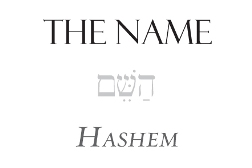From Praying the Names of God Week Sixteen, Day Four
The Name
Shem is the Hebrew word for "name" (the "Ha" before it is the definite article). The Bible speaks of Solomon's temple in Jerusalem as the place where God's name would dwell—the place where his people could pray and be heard. Jesus himself prayed that the Father would glorify his name through him. He also promised to do whatever we ask in his name. Philippians 2:9-10 affirms that God has exalted Jesus and given him "the name that is above every name."
Key Scripture
Hear the cry and the prayer that your servant is praying in your presence this day. May your eyes be open toward this temple night and day, this place of which you said, "My Name shall be there," so that you will hear the prayer your servant prays toward this place. (1 Kings 8:28-29)
***
Thursday
PRAYING THE NAME
Some trust in chariots and some in horses,
but we trust in the name of the LORD our God.
(Psalm 20:7)
Let him who walks in the dark,
who has no light,
trust in the name of the LORD
and rely on his God.
But now, all you who light fires
and provide yourselves with flaming torches,
go, walk in the light of your fires
and of the torches you have set ablaze.
This is what you shall receive from my hand:
You will lie down in torment. (Isaiah 50:10-11)
Reflect On: Isaiah 50:10-11
Praise God: For banishing our darkness through the light of Christ.
Offer Thanks: For God's readiness to help us in times of darkness.
Confess: Any tendency to seek safety apart from God.
Ask God: To help you see the futility of worrying rather than trusting.
One of my jobs as an eight-year-old was taking the garbage out right after dinner. It scared me silly because garbage disposal at our house involved dumping a portion of it into an old barrel, where it would later be burned (we hadn't heard of air pollution back then). It wouldn't have been so bad except that I had to walk at least a hundred yards in the dark before I could dump my smelly cargo and then run lickety-split back to safety. Realizing that an axe murderer or two was probably lurking at the edge of the woods bordering our home, I always took along a pearl-handled pistol, with a barrel at least twelve inches long. So what if it only shot caps? It comforted me and complemented my Hopalong Cassidy outfit rather nicely. I also hoped it would fool the resident maniacs and bad guys. It must have worked because I survived my eighth year without a single mishap!
When it comes to the dark, most children suffer as I did from an overactive imagination. But adults can have overactive imaginations too, even in daylight. We worry about whether our five-yearold will be ready for Harvard when the time comes, or whether a sudden frost will kill off the daffodils, or whether we'll be able to pour ourselves into last year's bathing suit. Such worries sound silly when you verbalize them. And though not all worries are so trivial, it remains true that worry is always counterproductive. It saps our energy and leads us down blind alleys as we conjure images of what might happen in the future. As a strategy for successful living, it's a complete failure.
God tells us that the antidote to worry is trust. He knows our limitations better than we do, realizing that when it comes to the future, we are all walking in the dark, unable to see past the minute we are living in. That's why he tells us to trust in his name, to count on his ability to see the future and prepare us for it—whatever may happen.
He also knows that trust and worry cannot coexist. We simply cannot do both at the same time. If we fail to trust him and instead rely on our own "light," our own limited understanding, we will find ourselves robbed of sleep and tormented by worry. Learning to trust in God's name in the darkest of times will enable us to lie down in peace, knowing we are safe.
For more from Ann Spangler, please visit her blogspot on Christianity.com. And be sure to check out Ann's newest books on AnnSpangler.com. To hear more from Ann Spangler, sign up today at annspangler.substack.com.
Meet your spiritual ancestors as they really were: Less Than Perfect: Broken Men and Women of the Bible and What We Can Learn from Them.



